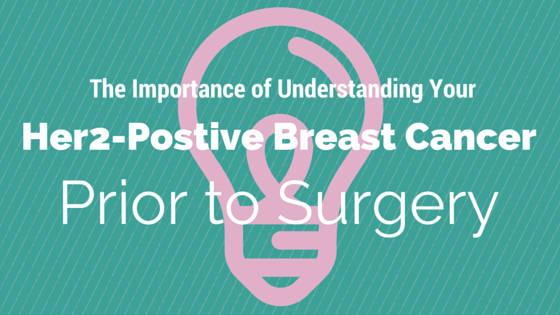
Breast cancer is an umbrella term we use to describe hundreds of different types of localized cancers. While there are five broad categories of breast cancer, each cancer is unique and requires its own, specialized treatment plan. Some cancers are more aggressive than others, which means your treatment plan may not require surgery as the first step.
Keep yourself informed.
It is very important that you intimately know your breast cancer prior to surgery. If you have just been diagnosed with breast cancer, or if you want to learn more about it, read my blog post, “I Have Breast Cancer, Now What?” There, I will help you understand the specific characteristics of the breast cancer you’re fighting so you know what to expect from your treatment and recovery.
For you to understand your breast cancer better, the most important thing to know is whether your cancer is Her2-positive. In “Targeted Therapies for Breast Cancer: The Silver Bullet,” I describe Her2-positive breast cancer in much greater detail. Although Her2-positive breast cancer is a very aggressive form of cancer, it is a subset that we are able to treat with great success.
If you have Her2-positive breast cancer, you may need chemotherapy prior to surgery.
If your Her2-positive breast cancer is larger than 2cm, you need chemotherapy prior to surgery. Perjeta, is a phenomenal medication that kills Her2-positive breast cancer. When used in conjunction with Herceptin, it must be administered prior to surgery due to FDA regulations. While Perjeta is effective after surgery, you may have to fight your insurance company to pay for it as most will not authorize “off-label” use of expensive medications, despite their effectiveness.
Consulting a specialist is the best way to ensure you’re receiving the most effective cancer treatment.
General surgeons are on the forefront of treating breast cancers, but it is difficult for them to be constantly aware of new non-surgical breast cancer treatments in the way that a breast surgical oncologist can. For this reason, Her2-positive breast cancers require a multidisciplinary team. If After your diagnosis, your first visit will probably be with a general surgeon. Afterward, you should consult a medical oncologist prior to surgical treatment or ask your general surgeon if he has presented your case to a tumor board, This should be done particularly if your cancer is larger than 2cm or if it is Her2-positive.
Unfortunately, breast cancer is quickly becoming a chronic disease. However, many breast cancers can be cured or held at bay for many,years. Even so, it is a serious disease that requires serious attention and a serious treatment plan. Most breast cancers, like those in Stage I, ER-positive, and Her2-negative, do not need further evaluation prior to surgical treatment. However, if your breast cancer is larger than 2cm, ER-negative, or Her2-positive, you should seek a consultation with a medical oncologist prior to surgical treatment.
As physicians, we are honor bound to do what is in your best interest. Always remember that you are not alone. You have a team of dedicated professionals fighting with you, guiding you, helping you. You can beat your breast cancer.